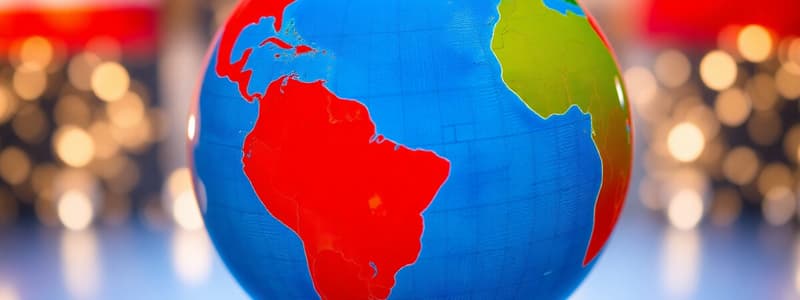Podcast
Questions and Answers
What characterizes a world-economy as defined in Braudel's concept?
What characterizes a world-economy as defined in Braudel's concept?
- It is limited to one culture and language.
- It consists of diverse political units with no central authority. (correct)
- It is governed by a single political structure.
- It prioritizes localized trade over global exchange.
In a capitalist system, what is the primary goal of individuals and firms?
In a capitalist system, what is the primary goal of individuals and firms?
- To focus solely on community-based production.
- To establish a cooperative marketplace.
- To achieve endless accumulation of capital. (correct)
- To maintain stability and avoid competition.
Which statement best describes the nature of markets in a capitalist economy?
Which statement best describes the nature of markets in a capitalist economy?
- Markets only exist physically and do not have a virtual counterpart.
- Capital accumulation is prohibited in market transactions.
- Markets are essential for buying and selling goods in both physical and virtual contexts. (correct)
- Firms have no rivalry in the market.
What describes the relationship between firms in a capitalist market?
What describes the relationship between firms in a capitalist market?
What is a common outcome for firms operating in a capitalist system?
What is a common outcome for firms operating in a capitalist system?
What is a primary driver of economic globalization?
What is a primary driver of economic globalization?
What effect does technological advancement have on globalization?
What effect does technological advancement have on globalization?
What does 'globalization of production' entail?
What does 'globalization of production' entail?
According to Wallerstein, what historical context shapes the modern world-system?
According to Wallerstein, what historical context shapes the modern world-system?
What role does outsourcing play in economic globalization?
What role does outsourcing play in economic globalization?
Which statement best describes economic globalization?
Which statement best describes economic globalization?
What is a characteristic of the 'time and space compression effect'?
What is a characteristic of the 'time and space compression effect'?
What is a significant consequence of reduced policy barriers in globalization?
What is a significant consequence of reduced policy barriers in globalization?
Flashcards are hidden until you start studying
Study Notes
Economic Globalization
- Refers to the increasing interdependence of world economies due to cross-border trade, capital flow, and technology spread.
- Described as an irreversible trend influencing global economic development, especially at the turn of the millennium.
- Major driving forces include:
- Rapid scientific and technological advancements, reducing transportation and communication costs.
- Expansion of market economic systems with diminished policy barriers to trade and investment.
Globalization of Production
- Involves sourcing goods and services globally to capitalize on national differences in production costs (land, labor, capital).
- Outsourcing: Obtaining goods or services from foreign suppliers instead of internal sources.
- Business Process Outsourcing (BPO): Specifically refers to services like call centers being outsourced.
Globalization of Technology
- Encompasses the worldwide exploitation of technologies through patents and licenses.
- Patents grant exclusive rights to inventors, allowing them to control the use of their inventions.
Historical Perspective
- The modern world-system emerged in the sixteenth century, mainly in Europe and the Americas, and gradually expanded globally.
- Defined as a capitalist world-economy characterized by a division of labor and significant internal exchange of goods, capital, and labor.
- Comprised of numerous political units connected in a loose interstate system, featuring diverse cultures and languages.
Capitalism Explained
- Capitalism prioritizes endless capital accumulation, differentiating the modern world-system from mere existence of market transactions.
- Markets serve as both physical and virtual spaces for buyers and sellers of goods.
- Firms act as primary market players; their success depends on competitiveness within the market.
- Intercapitalist rivalry drives innovation and efficiency, with survival of the fittest leading to frequent bankruptcies and consolidation of capital.
Studying That Suits You
Use AI to generate personalized quizzes and flashcards to suit your learning preferences.




